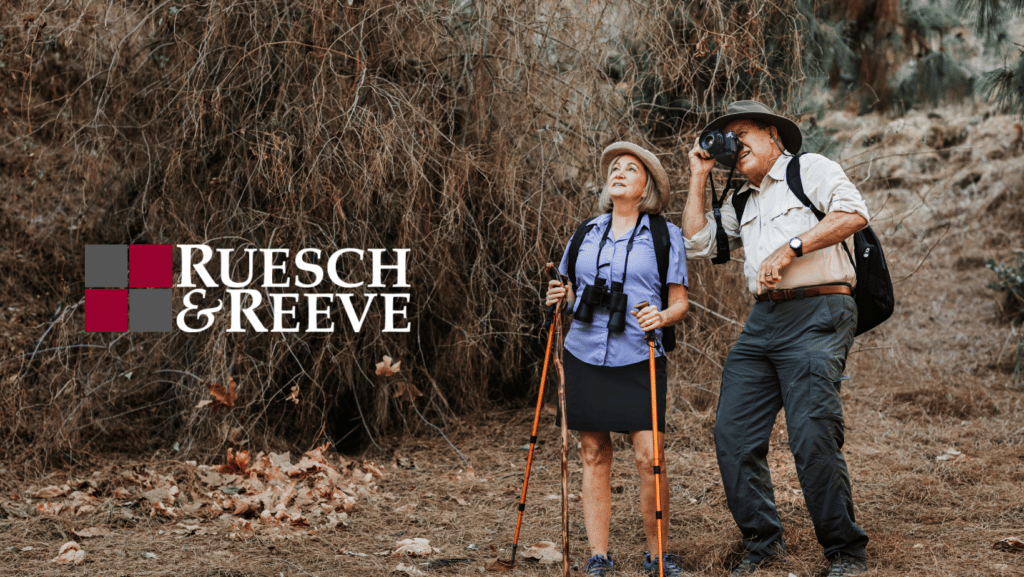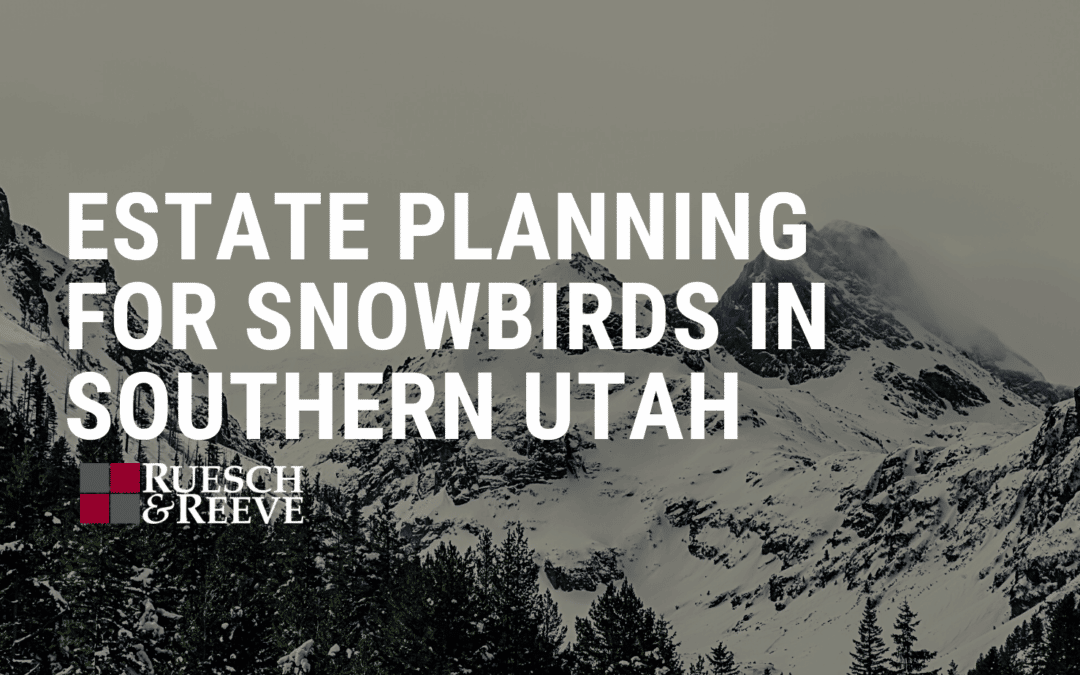For those of you who are not big fans of the cold weather, that means it’s time to head south when it’s nearing wintertime. Southern Utah is the best place for this; however, there are important things to know about estate planning for snowbirds in Southern Utah.
Snowbirds are known as people who move south for a few months to avoid the cold northern winter months.
Estate planning can get complicated if your domicile, the property that you consider to be your permanent residence, is in one state while your “snowbird” resident is in another, but it’s not impossible.
You first want to ensure you have followed all the steps in estate planning, especially if you own more than one property.

Ruesch & Reeve, a law firm based in Southern Utah, recommends a 12-step process for setting up your estate, which goes as follows:
- Create a will that states who you want to inherit your properties. This is when you would also name guardians to take care of your children if something happens to you.
- Create a trust so your survivors can avoid the probate process. (This step will be talked about in further detail later on.)
- Define your health care directives, which outline your healthcare wishes if you can no longer make those decisions for yourself and it will name who makes your health decisions if you can’t.
- Determine a financial power of attorney who is responsible for handling your finances and property if you no longer can.
- Ensure the protection of your children’s property by choosing an adult to manage the property and finances your minor children may inherit from you.
- Name a beneficiary on bank accounts and retirement plans so they become “payable upon death” to that person to avoid the probate process.
- Consider purchasing life insurance if you have young children, own a house, have debts, or owe estate taxes.
- Understand if you owe federal estate taxes because more than 99&% don’t. For deaths in 2022, the federal government will only impose estate tax at your death if your taxable estate is worth more than $12.06 million. The spouse of the diseased will be free of the estate tax, no matter the amount.
- Save ahead for your funeral costs by creating a “payable-on-death” account at your bank and depositing regular small payments.
- Outline your end-of-life wishes for anyone who needs to know if you wish to be a donor and how you would like to be buried or cremated. This should not be outlined in a will because it may not be seen until long after arrangements need to be made. Consider writing a letter to a loved one where they know it will be upon your death.
- Make plans for your business, whether it is a succession plan if you’re the sole owner, or a buyout agreement if you are a co-owner.
- Allow your attorney or executor to have access to the following documents they need after your death: A will; trusts; insurance policies; real estate deeds; stocks, bonds, and annuities certificates; bank accounts, mutual funds, and safe deposit boxes information; retirement plans, 401K accounts, or IRAs information; debt information including credit cards, mortgages and loans; utilities and unpaid taxes; information for funeral costs, and any final instructions for arrangements upon death

Now that you understand what you need to do for basic estate planning, move on to what entails estate planning for snowbirds in Southern Utah.
First, you need three basic estate planning documents in place for both states’ properties, which include a Health Care Proxy, Living Will, and Durable Power of Attorney.
While these documents are transferable between states, meaning one state will honor a document that was validated in another state, it will be more convenient for all parties involved to deal with the documents in the form they are used to. For example, documents such as the power of attorney document will have different rules and regulations in Washington than it does in Utah.
The second most important thing to know about estate planning for snowbirds in southern Utah is how to avoid an extensive and expensive process known as an ancillary probate. This process takes place when the deceased has property, such as a vacation home, that is located in a different state than the remainder of their estate is being handled.
If you own real estate in multiple states, each one will need to be probated, but the best alternative option to an ancillary probate is to create a revocable trust, also known as a living trust. By creating this trust and transferring any property owned outside of your state of residence, then you can avoid your survivors going through the ancillary probate process. After your passing, the property within that trust will be distributed according to the terms of the trust. Since it is a revocable trust, you have the right to change the terms at any time if you wish to do so.
A third factor to consider regarding estate planning for snowbirds in southern Utah is how state laws differ. If your will is executed in the state of your domicile under all the formalities that make it valid, it will be valid. The same goes for executing your will in the state of your second home. The catch may be, however, that the laws of the state where your will is probated will apply but will not apply where your will is executed.
Each state may also hold your executors to different standards, such as requiring them to be current residents of the state where your will is being executed or having a certain relationship with the deceased.
You can contact R&R for help making these arrangements and understanding the extent of the laws in Utah for your snowbird property. This law firm takes on individual and corporate clients to provide transactional, litigation, and regulatory assistance.
Ruesch & Reeve provides legal assistance in the following areas: Adoption law, bankruptcy, business & corporate law, construction law, criminal defense, estate planning and probate, family law, immigration law, land use & zoning law, litigation, mining law, personal injury law, real estate development and finance, and water law.
Another important aspect when it comes to estate planning for snowbirds in southern Utah is understanding real estate tax laws within the state of Utah.
Know the difference between tax deductions on your domicile property and your second home in Utah, if the two are in different states. Each state has its individual law on state-level tax breaks; Utah’s is 45% for owner-occupied homes which means if your permanent residence property is valued at $400,000, the taxable value would be $220,000.
Consider obtaining a real estate tax accountant prior to purchasing a property to discuss your situation. Speaking with an accountant to understand the extent of your real estate is especially important if you plan to list it on Airbnb for the remainder of the year that you’re in your domicile property.
Homeowners who list their property on Airbnb need to get special insurance to cover damages from guests because their traditional homeowner’s insurance will not cover these claims.
Airbnb recently updated its policy, adding benefits to its insurance policy, AirCover. It comes with $1 million in liability insurance, $1 million in damage protection, and a 14-day window to file the claim. The coverage includes damage caused by guests or their pets, loss of income in the case of canceling due to damage, and unexpected cleaning costs,
It is still critical that these homeowners have traditional homeowners insurance in conjunction with Airbnb insurance because AirCover only covers property damage while it’s being occupied by a paying guest. Any other damage and wear and tear will need to be claimed through traditional insurance.
Another difference between the two insurances is that AirCover will only reimburse a host if they have first attempted to reconcile the cost of damage with the guest first.
The other important information to know when renting out your snowbird property while you’re at your domicile is the tax filing laws. You will need to report the income you earned to the IRS if you rent out your property for more than 14 days. If you are not considered a business expert, meaning you don’t do other business of your own and this is just a part-time gig, then you can fill out a Schedule E form and avoid additional self-employment taxes.
You may also need to pay occupancy taxes when renting out your property. This tax is similar to hotel taxes and fees for operating a short-term rental property.
Be sure to read your documents with Airbnb to determine if you need to collect and submit the taxes from your renters or if Airbnb will collect and submit them.

As you can see, a lot of logistics are in play when owning a second property to live in for part of the year. If you have plans to become a snowbird in the future or are currently one, contact Ruesch & Reeve to discuss your estate plan, update it if necessary to fit your plans of being a snowbird in southern Utah.

